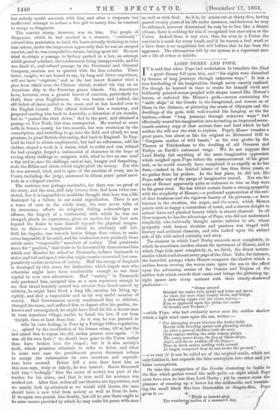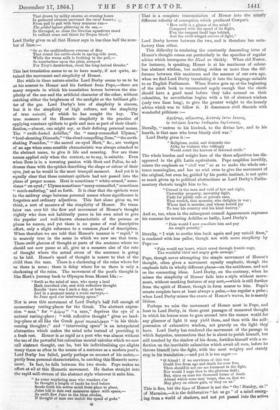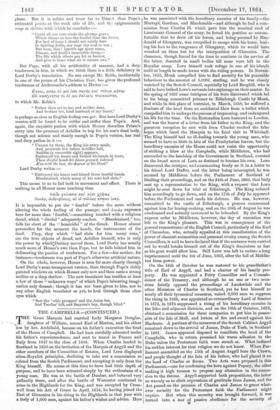Company, anxious not to quarrel with the free colonies. These
IT is said that when Pope had undertaken to translate the Iliad
tude as a relapsed convict. Pope, suffer any of the pangs of imaginative travail. Nor are the As when the west wind freshly blows, and brings (Soft zephyr curling the wide watery plain), it i :—
That drawn by milky steams at evening hours In gathered swarms surround the rural bowers; From pail to pail with busy murmur run— The gilded legions glittering in the sun,— So thronged, so close the Grecian squadrons stood In radiant arms and thirst for Trojan blood."
Lord Derby gives us all that Homer says in less than half the num- ber of lines :—
" Or as the multitudinous swarms of flies
That round the cattle-sheds in spring-tide pour,
While the warm milk is frothing in the pail,—
So numberless upon the plain, arrayed For Troy's destruction, stood the long-haired Greeks."
This last translation seems to us to have nearly, if not quite, at- tained the movement and simplicity of Homer.
But while in these nature-similes Lord Derby seems to us to be at his nearest to Homer and his furthest from Pope,—there are many respects in which his translation hovers between the sim-
plicity of the one and the artificial character of the other, without catching either the brightness of the sunlight or the brilliant glit- ter of the gas. Lord Derby's love of simplicity is sincere, but it is the simplicity of high culture, not the simplicity of true naïveté, of which he has caught the key. The true measure of the Homeric simplicity is the practice of applying constant epithets to gods and men as part of their identi- fication,—almost, one might say, as their defining personal names.
The "swift-footed Achilles," the "many-counselled Ulysses," 4' loud-shouting Diomede," "the cloud corapelling Zeus," "the earth-
shaking Poseidon," "the sacred ox-eyed Herb," &c., are vestiges of an age when some sensible characteristic was always attached to the abstract name, to give it life and meaning. Nor are these names applied only when the context, so to say, is suitable. Even when Zeus is in a towering passion with Herb and Pallas, he ad- dresses them with the epithet describing the shape or colour of their eyes, just as he would in the most tranquil moment. And yet it is equally clear that these constant epithets had not passed into the phase of proper names. Here is sometimes " white-armed," some- times" or-eyed ;" Ulysses sometimes "many-counselled," sometimes "much-enduring," and so forth. It is clear that the epithets were in the midway stage between personal names whose significance is forgotten and ordinary adjectives. This fact alone gives us, we
think, a sort of measure of the simplicity of Homer. No trans- lator can ever hit the flow and movement of Homer's thought rightly who does not habitually pause in his own mind to give the popular and well-known characteristic of the persons or places he names, and yet there is no pause of real descriptive effort, only a slight reference to a common fund of description. When therefore we are told that Homer's manner is "rapid," it
is scarcely true in the sense in which we now use that term. These swift glances of thought at parts of the sentence where we
should not now pause at all, give us a measure also of the rate of thought where the actual stress of the sentence is going
to be laid. Homer's speed of thought is nearer to that of the .child than the man. There is a slackening of the reins where for
us there is none ; there is delay where for us there is only a slackening of the reins. The movement of the poet's thought is like Herb's journey back to Olympus from Mount Ida :— "Swift as the mind of man, who many a land Hath travelled o'er, and with reflective thought Recalls 'here was I such a day, or here,' And in a moment many a scene surveys,— So Juno sped o'er intervening space."
Nor is even this movement of Lord Derby's half full enough of momentary resting-places for the Greek. The abstract expres-
sion " man " for 4.141205" "a man," deprives the eye of a natural resting-place ; "with reflective thought" gives no land- ing-place at elflike the Greek 9pso./ Irstocahnoi "in his thick- coming thoughts ;" and "intervening space" is an interpolated
abstraction which makes the mind ache instead of providing it
a fresh rest. Homer is as rapid as a poet who was almost without the use of the powerful but colourless mental calculus which we now
-call abstract thought, can be, but his individualizing eye alights many times as often in the course of a sentence as a modern poet's. Lord Derby has failed, partly perhaps on account of his metre,— partly from personal characteristics, in catching this Homeric move- ment. In fact, he falls between the two stools. Pope makes no -effort at all at this Homeric movement. He dashes straight into the rapid mill-stream of the abstract style wherever it suits him.
"As some wayfaring man who wanders o'er In thought a length of lands he trod before Sends forth his active mind from place to place, Joins hill to dale and measures space with space,— So swift flew Juno to the bleat abodes, If thought of man can match the speed of gods."
That is a complete transmutation of Homer into the utterly different velocity of conception which produced Cowper's
"How swift is a glance of the mind ! Compared with the speed of its flight, E'en the tempest itself lags behind, And the swift winged arrows of light."
Lord Derby hovers between the two, and is therefore less satis- factory than either.
This difficulty in rendering the constantly descending ictus of Homer's thought comes out particularly in the speeches of regular advice which intersperse the Iliad so thickly. When old Nestor, for instance, is speaking, Homer is at his maximum of colour- less abstract wisdom, but nothing strikes us more than the dif- ference between this maximum and the manner of our own age, when we find Lord Derby translating it into the language suitable to an English Parliament. When Nestor gets up at the beginning of the ninth book to recommend sagely enough that the chiefs should have a good meal before they take counsel on their calamities, he nevertheless begins with a bit of abstract wisdom (only two lines long), to give the greater weight to the homely advice which was to follow it. It denounces civil discords with wonderful pithiness :— appiresp, agip,aros, av.4r14 rIY xerros,
Iparar icrioniziou bep6ospros-, literally, "untrue to his kindred, to the divine law, and to his hearth, is that man who loves bloody civil war."
Lord Derby gives it :— "Religious, social, and domestic ties Alike he violates who willingly
Would court the horrors of internal strife."
The whole burden and weight here of the three adjectives has dis- appeared in the glib Latin equivalents. Pope amplifies horribly, misses the emphasis on "civil war" so as to make the whole sen- tence meaningless, and has no wish even to give the movement of the original, but even he, guided by his poetic instinct, is not quite so much given up to political abstractions as Lord Derby's Parlia- mentary rhetoric taught him to be.
"Cursed is the man and void of law and right, Unworthy property, unworthy light, Unfit for public rule or private care, That wretch, that monster, who delights in war ; Whose lust is murder, and whose horrid joy To tear his country and his kind destroy."
And so, too, when in the subsequent council Agamemnon expresses his remorse for treating Achilles so badly, Lord Derby's
"Fain would I now conciliate him and pay An ample penalty,"
literally, "I wish to soothe him back again and pay untold fines," is rendered with less pallor, though not with more simplicity by Pope :-
"Fain would my heart, which erred through frantic rage, The wrathful chief and angry gods assuage."
Pope, though never attempting the simple movement of Homer's thought, often gives a movement equally emphatic, though the emphasis falls in wholly different places—on the antitheses, and not on the connecting ideas. Lord Derby, on the contrary, when he misses the simplicity of Homer falls into a style without move- ment, without marking features of any sort,—which is still further from the spirit of Homer, though in form nearer to him. Pope's ornate couplets have at least always a pulse,—too regular a pulse ; when Lord Derby misses the crests of Homer's waves, he is merely
lifeless.
Perhaps we miss the movement of Homer most in Pope, and
least in Lord Derby, in those great passages of measured thought in which his heroes seem to gaze around into the unseen world for any glimmer of light it may yield them, and then with the self- possession of exhaustive wisdom, act gravely on the light thsi have. Lord Derby has rendered the movement of the passage in which Sarpedon, unconscious that he is about to perish himself, but still touched by the shadow of his doom, fortifies himself with a re- flection on the inevitable calamities which await all men, before he throws himself into the fight, with the most weighty and stately step in his translation ;—and yet it is too eager :— " 0 friend ! if we survivors of this war Could live from ago and death for ever free, Thou should'st not see me foremost in the fight, Nor would I urge thee to the glorious field ; But, since on man ten thousand forms of death Attend which none may 'scape, then on, that we May glory on others gain, or they on us." This is fine, but the fops, of Homer is not the " On ! Stanley, on I" of Marmion,—it is the deliberative "let us go" of a mind emerg- ing from a world of shadows, and not yet passed into the active phase. But it is nobler and truer far to Homer than Pope's reiterated pricks at the weak side of life, and tha epigrammatic coup de theatre with which he concludes :— " Could all our care elude the gloomy grave, Which claims no less the fearful than the brave, For lust of fame I should not vainly dare In fighting fields, nor urge thy soul to war ; But soon, alas ! ignoble age must come, Disease, and death's inexorable doom,— The life which others pay let us bestow, And give to fame what we to nature owe."
But Pope, with all his artificiality of manner, had a deep tenderness in him, in which we think there is a little deficiency in
Lord Derby's translation. No one except Mr. Keble, incidentally in one of the poems of his Christian Year, has given the profound tenderness of Andromache's address to Hector :--- isrop, ands at!, p,61 low, 5rocrip xceZ ,741-viot pirtip sac/rango i pot OaXspb; Ira pcesoic,x, -
to which Mr. Keble's
"Father thou art to me, and mother dear, And brother too, kind husband of my heart,"
is perhaps as close as English feeling can get. But here Lord Derby's version will be found to be colder and stiffer than Pope's. And, again, the exquisite pathos with which Homer describes Priam's entry into the presence of Achilles to beg for his son's dead body, though not solemn and stately enough in Pope's version, has real and deep pathos in it :—
" Unseen by them, the King his entry made,
And, prostrate low before Achilles laid, Sudden (a venerable sight) appears.
Embraced his knees and bathed his hands in tears, Those direful hands his kisses pressed, imbrued E'en with the best, the dearest of his blood" Lord Derby writes :—
" Embraced his knees and kissed those fearful hands Bloodstained, which many of his sons had slain."
This seems to us to fail both in movement and effect. There is nothing in all Homer more touching than
Xei136 7-oinscorec sea zoos xeipa; suya5, elvdpoco6von, al of croXiccs. 2491;0010 bias.
It is impossible to put the "fearful" before the noun without altering the whole feeling of the passage; and Semis expresses here far more than fearful,'—something touched with a religious
dread, which " direful " adequately renders. "Bloodstained," too, falls far short of the " homicidal " of the Greek. Homer almost personifies for the moment the hands, the instruments of the deed. They, they which "had slain for him many sons," are the true objects of dread, not Achilles himself, who is only the power by which:Destiny moved them. Lord Derby has usually much more of Homer's awe than Pope, but he falls behind him in delineating the passion of tenderness. For a few—his mother, for instance—tenderness was part of Pope's otherwise artificial nature.
On the whole, however, Homer is seen far more clearly through Lord Derby's semi-transparent version, than through Pope's richly painted windows on which Homer only now and then casts a strong outline or a deep shadow. The new translator has trodden at least a few of those "unknown ways" of which Pope's labouring imagi- nation only dreamt; though it has not been given to him, nor to any other English translator as yet, to look through those clear eyes which
"Saw the wide prospect' and the Asian fen,
And Tmolns' hill, and Smyrna's bay, though blind."
































 Previous page
Previous page